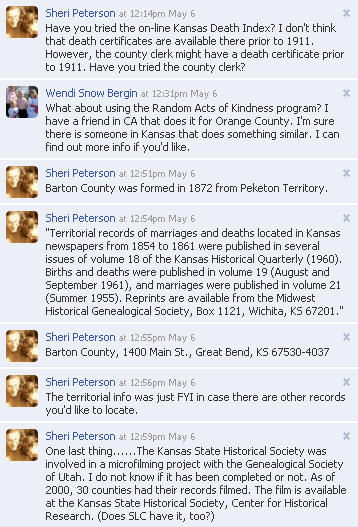Yesterday Dick Eastman posted an interesting
article about the popularity of genealogy. His summation:
I will suggest that genealogy is indeed a very popular activity among Americans. Hundreds of thousands, perhaps a million, people are actively looking for their family heritage. However, that number pales in comparison to some other personal interests that I have mentioned.
As proof points he contrasts some indicators of interest in genealogy to indicators of interest in other popular activities like sports. He rightly (and convincingly) points out that if the interest in genealogy is so high (Time Magazine reported it as one of the four most popular activities on the Internet in 1999) then there should be other indicators like money spent, magazine subscriptions or attendance at conventions. He points out that the dollars spent on genealogy pale in comparison to the billions spent on sports. Where for example is the Sports Illustrated of genealogy? Why are there so few attendees at the National Genealogical Society conference but 40,000+ at a Star Trek convention?
Well to be truthful, Dick is right. The number of people sufficiently interested in genealogy (as offered in the current magazines, trade shows, etc.) is quite low compared to other major hobbies. So how do you account for the difference between Time Magazine and Dick Eastman? Did Time get it wrong and Dick get it right? There is a simple explanation and here it is:
Interest < Barriers to AdoptionThere is no question, in my opinion, that the majority of people in America (and I suspect on this planet) do have a strong interest in knowing more about their ancestry. However the effort required in order to satisfy that interest is currently too high for most people. Try this test on a random friend. Tell them that you have found a picture of their 3rd Great Grandpa and you think there are some striking similarities. Ask them if they’d like to see it. What do you think the response rate would be? Pretty high.
Then tell that friend that to see it they have to pay you $350, create a research plan, keep a research log, spend countless hours scanning through microfilm, become an expert on the Palatine Migration, learn to read ancient German and walk across a bed of hot coals barefoot while carrying an elephant in one hand. The number of positive responses goes down slightly.
People are interested in their ancestors. They aren’t interested in becoming genealogist or in running a gauntlet to satisfy that interest. The creators of genealogy magazines, conferences and the industry as a whole have focused on delivering something that is of interest to those that are willing to run the gauntlet. For example, Elizabeth Shown Mills excellent reference, Evidence Explained, while impressive in detail and thud factor, is not going to be on the coffee table of the average American. I’m sure this wasn’t her intention. To the average person it makes the gauntlet that much more overwhelming. To those that are willing to run the gauntlet it is an essential reference.
I believe we are getting close to a tipping point on the equation. Imagine what would happen if the equation changed.
Interest > Barriers to AdoptionThere has been a flurry of activity in the industry recently trying to make genealogy accessible to the masses. For example, both
Geni.com and
FamilyLink’s We’re Related Facebook application have millions of subscribers. I suspect that ‘serious’ genealogists don’t consider these very relevant – especially We’re Related. They are extremely relevant to me. They have successfully created something that allows the average person with an interest in genealogy to start playing. There is however still a gap between the ordinary person’s desire to know about their ancestors in a rich, accurate and easy way and what these applications offer.
What will it take to deliver an experience that is accessible to the average person but can still help them discover their ancestors in a genealogically sound manner without requiring them to become a genealogist? Here’s an extremely high level list. Just making progress on these four items would take us past the tipping point.
- Make the most relevant historical records viewable and searchable online. FamilySearch and The Generations Network (and many others) are actively working on this.
- Remove inhibitors to collaboration. Geni.com and FamilyLink are making progress on this by integrating social networking concepts with genealogy. Their efforts aren’t a complete solution but a good start.
- The system knows how to do genealogy so the user doesn’t have to. I think there are three major areas of focus on this one: 1) The system needs to be able to help the user decide what to do 2) the system must be able to identify and execute a research strategy 3) the system must be able to help the user perform meaningful analysis of evidence without the user having to know how to analyze evidence (I believe this is the hardest one).
- Integrate item two and three above so that the system can take the complex work process of genealogy, divide it into discreet tasks and spread those tasks across large numbers of users (based on their interest, resources and skill) and coordinate the final outcome into ‘completed’ genealogical research.
While these are hard tasks, they are not impossible tasks. They are hard on the order of a decade or two. The tipping point however is within five years. When that happens there are hundreds of millions of people with an interest in their ancestors that will be able to have a meaningful experience without having to walk on hot coals or carry elephants.



